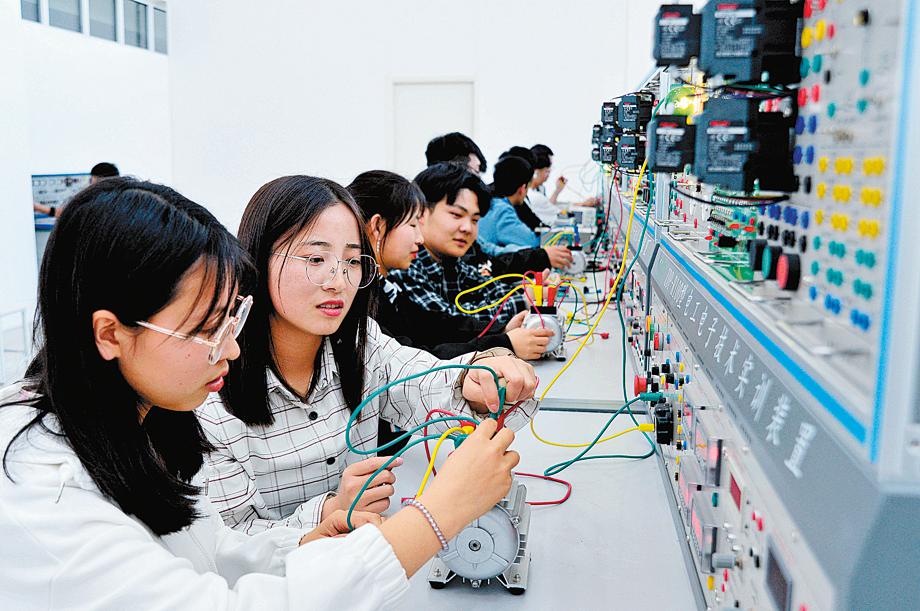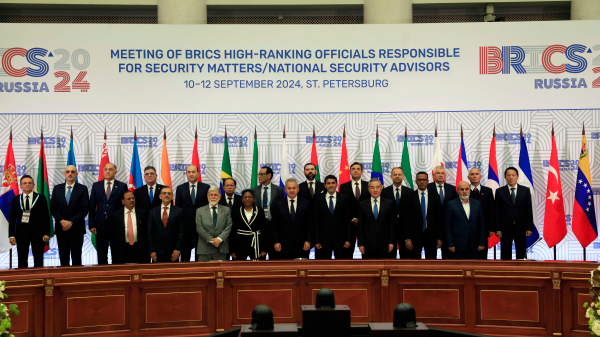Incentives to enroll in vocational schools help drive interest as shortage continues
Bolstered by official policy support, many young people in China are striving to become skilled professional workers as the manufacturing industry plays an increasingly important role in the nation’s quality-oriented development.
A recent survey by Zhaopin, an online recruitment platform, shows that job offerings in the high-tech manufacturing sector rose by 28.2 percent year-on-year in the first four months of this year-much higher than the average growth of vacancies in other sectors, which rose roughly 8.4 percent over the period.
Workers who are skilled in industrial automation, electric equipment production and general equipment production are in high demand, according to the survey. For example, more than 50 percent of electric equipment production job vacancies are open to skilled workers.
However, the manufacturing sector is still grappling with labor shortages, especially for workers at the master level. The latest figures from the Ministry of Human Resources and Social Security show that China has over 200 million skilled workers, roughly 26 percent of the total labor force, and about 50 million of those skilled workers are certified with master status.
To help relieve the shortages, central departments have made continuous efforts to incentivize more people to take up vocational studies in the past few years.
In late May, the ministry released a notice about a plan for vocational schools to recruit 1.4 million students and train them in accordance with the practical needs of companies and the nation’s economic development.
Compared with vocational schools guided by the Ministry of Education, which is academic-driven and steers students toward earning education degrees after graduation, the vocational schools administered by the human resources ministry focus on developing students’ work skills, and upon graduating they receive certificates related to those skills.
According to the ministry’s notice, vocational schools are encouraged to team up with companies and employers to provide high-quality education and training to students.
Students from key areas, including those who have benefited from the nation’s rural vitalization campaign, can take advantage of preferential policies such as prioritized school registration, the notice said.
Peng Weihua, vice-dean of Yunnan Technician College in Southwest China’s Yunnan province, said that vocational graduates have better employment prospects than college students, as their future plans for employment are more clear.
“Vocational students know that they will become skilled workers through training and education at school, so they can make their career plans before graduating,” he said. “Also, the schools set up training plans in accordance with companies’ needs to help students get easier access to job opportunities.”
Peng said that the huge number of college graduates this year-about 10.76 million-puts pressure on the job market, but skilled vocational school graduates will find more opportunities.
“China still has a great demand for skilled workers, actually. It’s time to change the traditional mindset that being a researcher or manager is superior to being a skilled worker,” he said.
According to Peng, graduates from his college have enjoyed an employment rate of around 98 percent over the past three years.
“The average monthly salary for our graduates in Yunnan is about 5,673 yuan ($848). This is much higher than the average salary of other graduates in the province, who take in about 2,500 yuan per month.”
Thanks to the government’s preferential policy in securing jobs for vocational school graduates, more provinces and cities are exploring new ways to land these skilled workers.
Beijing recently released a plan to allow vocational school graduates to participate in the civil servant examination for the first time, which also encourages administrative fields to hire skilled workers.


 Sports7 days ago
Sports7 days ago
 Tourism4 weeks ago
Tourism4 weeks ago
 Local2 weeks ago
Local2 weeks ago
 Sports3 weeks ago
Sports3 weeks ago
 Education2 weeks ago
Education2 weeks ago
 Local2 weeks ago
Local2 weeks ago
 Health3 weeks ago
Health3 weeks ago
 Local2 weeks ago
Local2 weeks ago



















